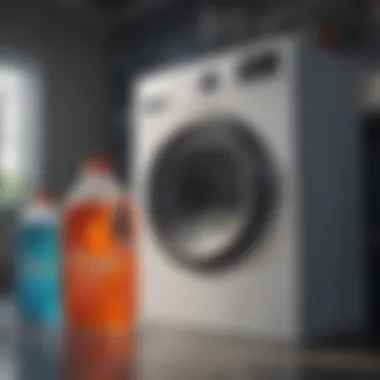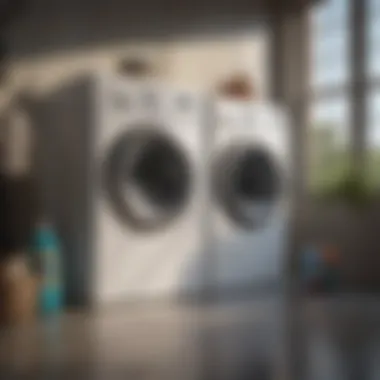Best Laundry Detergents for Well Water Challenges


Intro
Living with well water has its perks: you often enjoy a natural source of hydration that is less treated than municipal water. However, this boon comes with a handful of challenges, especially when it comes to laundry. The mineral content found in well water can hinder your laundry's cleanliness and brightness. This article addresses the nuances of laundry detergents specifically designed for use with well water, helping you navigate the often murky waters of what will get your clothes fresh and clean.
Choosing the right laundry detergent when using well water is no small feat. Ordinary detergents might not cut it, leading you to wonder if your favorite brand is worth the trouble. The right product can make all the difference, affecting not only how well your clothes are cleaned but also how they feel and smell.
Whether you are dealing with hard water mineral buildup or fabric damage, making informed choices about laundry products can lead to superior cleaning results and extend the life of your garments. We will cover various aspects, assisting housewives and homeowners in finding a detergent tailored for well water users, enhancing laundry efficiency and sustainability.
Understanding Well Water Characteristics
Before diving into product recommendations, it's essential to understand the characteristics of well water. Generally, well water can vary significantly based on mineral content, which might include iron, calcium, magnesium, and sulfur. Each mineral brings its own set of challenges for laundry users:
- Iron often leads to reddish stains, particularly on white fabrics.
- Calcium and Magnesium contribute to hardness, reducing detergent effectiveness.
- Sulfur can impart a distinct odor to clothing, making it feel and smell less than fresh.
Understanding these factors will guide you in selecting the most suitable detergent, ensuring that you accommodate the unique challenges of your water source.
Key Features of Suitable Detergents
When searching for the right laundry detergent to use with well water, there are key features to consider:
- Low Sudsing Formulas: High suds can complicate the rinsing process, leading to residue buildup.
- Stain Fighting Properties: A good detergent should be robust enough to tackle iron stains and other marks associated with mineral-heavy water.
- Water Softening Agents: These ingredients can help counteract hardness, improving cleaning efficacy.
By focusing on these elements, you can make an informed choice regarding the detergents that will work best with your well water.
Product Recommendations
While numerous products claim to be effective with well water, not all are created equal. Here are a few options to consider, noted for their compatibility and performance:
- Tide Plus a Touch of Downy: Renowned for its stain-fighting abilities and fabric care, this product offers a good balance when dealing with the unique challenges posed by well water.
- Arm & Hammer Clean Burst: Known for its powerful cleaning components derived from baking soda, it works well at combating tough odors often linked to well water.
- Seventh Generation Free & Clear: This environmentally-friendly option is free of dyes and perfumes, perfect for sensitive skin while still effectively tackling tough stains.
When selecting any laundry detergent, always consider how it aligns with your specific needs and the mineral content of your well water.
End
Navigating the world of laundry detergents is often like swimming against the tide, particularly when your main supply comes from well water. Understanding the unique hurdles that arise from minerals in your water can illuminate the path towards cleaner clothes and fresher scents. Selecting the right product is only half the battle; implementing washing techniques suited for well water will further enhance your outcomes.
With the right information at your fingertips, you can transform laundry day from a chore into a success story, ensuring that your garments come out clean, bright, and free from unpleasant mineral baggage.
Understanding Well Water
Well water plays a crucial role in households that rely on it for daily activities, including laundry. Unlike city water, which typically undergoes extensive treatment, well water often contains naturally occurring minerals and impurities that can significantly affect the quality of cleaning. This section explores what makes well water unique and how it influences the effectiveness of laundry detergents.
Composition and Characteristics
The characteristics of well water can vary greatly depending on the geographical location and the depth of the well. Key elements found in well water include minerals like calcium, magnesium, iron, and manganese. The concentration of these minerals can affect both the detergent's performance and the overall cleanliness of clothes.
- Hardness: The hardness of well water refers to the amount of calcium and magnesium present. Water with high hardness can make it difficult for cleaning agents to lather effectively, causing them to be less efficient.
- Iron and Manganese: Presence of these can lead to staining; iron often results in rust-colored spots, while manganese gives off a pinkish hue.
- pH Levels: The acidity or alkalinity of water also plays a key role. Well water can range from acidic to alkaline, affecting how cleaning agents interact with stains and fabrics.
Understanding these characteristics is essential for selecting appropriate detergents, as specific formulas can better handle the challenges posed by well water. By knowing what’s in your water, you can choose a detergent that not only cleans well but also preserves the integrity of your clothes.
How Well Water Affects Cleaning Agents
Well water's unique properties influence how effective traditional cleaning agents can be. For homeowners, it isn't just about dumping detergent into the wash. Several factors come into play:
- Detergent Interaction: The minerals in well water can bind with detergent molecules, turning them less effective. This also might mean using more detergent to achieve similar results, which is not economical.
- Residue Issues: In some instances, you might find that clothes come out of the wash with a sort of dullness. This can be a result of mineral residues, meaning that not all detergents are created equal for these water conditions.
- Foam Production: If the water is especially hard, common high-suds detergents will struggle to create the desired lather, which can lead to underwhelming washing experiences.
Takeaway: Knowing how well water interacts with cleaning agents can save a lot of time and effort in managing laundry. Investing in the proper laundry detergents tailored for such contexts can yield sparkling results, making sure your clothes remain fresh and bright.


Challenges of Using Well Water for Laundry
Using well water for laundry can come with its set of trials that are both unique and often overlooked. The nature of well water—exposed to various minerals and contaminants—can affect how your laundry comes out, potentially leaving bottles of detergent on a shelf and clothes looking less than their best. Understanding these challenges is crucial for anyone relying on well water, as it informs not just the choice of detergent, but also the overall approach to laundry.
Mineral Buildup and Staining
One of the foremost issues to confront when using well water for laundry is the mineral buildup that can occur over time. Hard water, which is a common characteristic of well water, is rife with minerals such as calcium and magnesium. When these minerals accumulate in your fabrics, they can lead to various complications.
For instance, clothes washed in hard water often develop an unpleasant stiffness and may also exhibit a dull appearance. Stains are another concern; they may manifest as unsightly spots or even a yellowish film on fabrics. This isn’t just a cosmetic problem; the integrity of your garments can suffer too. If left unattended, the buildup can lead to irreversible damage, affecting the color and texture of your clothes.
It's advisable to use laundering techniques that help combat this mineral effect. Pre-soaking garments in a vinegar solution or using specialized softening agents can help soften the hard water before it meets your laundry.
"Regular monitoring of your well's mineral content is key; consider testing the water periodically to see what you're dealing with."
Water Hardness Levels
Water hardness levels can dramatically influence your laundry experience. The hardness of well water is typically categorized as soft, moderately hard, hard, or very hard. Each classification dictates how effective your detergent will be at cleaning fabrics.
When dealing with hard or very hard water, traditional detergents may not lather efficiently, and you might end up using more detergent than necessary. This results in wasted resources and less than optimal results. A direct consequence is an increase in detergent residue left behind on clothing, which can lead to further issues such as skin irritation for sensitive individuals.
To assess water hardness, there are testing kits available that can give you a quick read on the situation. When choosing a detergent, it’s beneficial to look for those tailored to specific water hardness levels. Selecting the right product can make a world of difference, potentially saving you both time and effort in your laundry process.
By understanding the challenges posed by well water, you can start to navigate the complexities and choose the right materials and methods, ensuring that your laundry remains fresh and clean.
Key Features of an Ideal Detergent for Well Water
When it comes to laundry, especially for those relying on well water, finding the right detergent is crucial. Well water can be a mixed bag; it's often rich in minerals and may vary significantly in quality. Thus, the ideal detergent should cater specifically to these unique challenges. Let's delve into the key features that such a detergent must possess.
Low Suds Formulation
Laundry detergents that produce low suds can be your best friends if you’re dealing with well water. Why? Because excess suds can lead to residue buildup in your machine, which is no picnic. Most modern washing machines are designed to handle low-sudsing products, and these formulations are generally more efficient with water and energy. Using a low suds detergent not only improves cleaning performance but also minimizes the need for rinsing and contributes to the longevity of your appliance.
Mineral-Attacking Components
Minerals are the bane of laundry when using well water. They can leave deposits that stain clothes or interfere with the effectiveness of your detergent. Therefore, a good detergent should contain mineral-attacking components that target these troublesome impurities. Ingredients like citric acid or specific enzymes break down calcium and magnesium particles, allowing the detergent to work its magic. It’s about making sure your clothes end up cleaner without any unwanted residue.
Natural Ingredients
There has been a noticeable shift towards eco-friendliness in laundry products, and well water users should pay attention to this trend. Detergents that rely on natural ingredients tend to be gentler on fabrics, skin, and recycling efforts. For households sensitive to certain chemicals, looking for products that boast plant-based surfactants can be beneficial. They not only tackle stains effectively but also reduce the environmental impact of your washing routine. Remember, a cleaner planet is just as important as cleaner clothes.
"Choosing a detergent that aligns with your well water conditions can mean the difference between laundry that shines and a frustrating chore."
In summary, when selecting a detergent suited for well water, prioritize those with low suds formulations, mineral-attacking components, and natural ingredients. Each of these features contributes significantly to achieving optimal results, making laundry day a much smoother operation.
Top Recommended Laundry Detergents for Well Water
When it comes to laundering clothes with well water, choosing the right detergent is crucial. This isn’t just a matter of preference; it's about functionality. Well water is often rich in minerals that can hinder cleaning effectiveness, so specific features in detergents can make a world of difference. Certain brands have tailored their formulations with low suds and mineral-fighting agents, which can be game changers for households relying on well water. Let’s dive into some standout recommendations that can help you not only clean but also protect your laundry appliances.
Brand A: Features and Benefits
Brand A makes waves in the laundry detergent market with a special formula designed for well water users. This brand prides itself on creating an effective low suds detergent that balances cleaning power with environmental friendliness.
Key Features:
- Low Suds Technology: Less sudsing means less buildup in your washing machine, making it a great choice for well water.
- Stain Fighting Power: This detergent enhances your stain removal capabilities by actively working against mineral deposits that can often cause discoloration.
- Safe for Sensitive Skin: It’s made with fewer harsh chemicals, making it gentle for families with skin sensitivities.
The combination of these features not only ensures that your clothes come out clean but also that your washing machine stays in good shape for years to come. You won’t need to worry about clogging or mineral residue which often leads to costly repairs.
Brand B: Performance with Hard Water


Brand B stands out in its performance, particularly when it comes to dealing with hard water, where it can really flex its muscles. The unique formulation is specifically created addressing the challenges well water poses.
Why it Works:
- Water Softening Agents: These components combat the hardness of minerals, allowing the detergent to penetrate fabric fibers more efficiently.
- Enhanced Cleaning Efficiency: Users have noted significant improvement in stain removal performance, even with tough soils that typically linger.
- Compatibility with Cold Water: Perfect for those looking to save on energy bills, this detergent works wonders even in cool temperatures.
Households that have reported using Brand B consistently mention that their whites are brighter, and the colors of their laundry seem to hold up longer. With this brand, you're not just getting a cleaner; you're combating the specific mineral challenges of well water.
Brand C: Environmental Impact and Efficacy
In today’s world, being eco-conscious is more important than ever. Brand C offers a product that aligns with those values while also keeping cleaning efficiency in check. For well water users, the environmental footprint of a detergent matters just as much as its cleaning power.
Highlights:
- Biodegradable Ingredients: All components are designed to break down naturally, minimizing environmental harm.
- Concentration Formula: A little goes a long way, which is not only cost-effective but reduces waste.
- Highly Efficacious in Well Water Conditions: Many users praise its ability to tackle the challenges of hard water while ensuring minimal environmental impact.
Through responsible use, consumers can enjoy clean garments while feeling good about their choices. This brand ultimately balances efficacy with sustainable practices, proving that you can indeed champion both cleanliness and care for our planet.
"Choosing the right laundry detergent, especially for well water, can be the difference between a laundry day success and a frustrating experience."
These three brands demonstrate that there is no need to sacrifice performance for specific needs when it comes to doing laundry with well water. Each brings something unique to the table, ensuring your laundry results are nothing short of impressive.
How to Choose the Right Detergent
Choosing the right laundry detergent for use with well water is crucial, as it can significantly influence the cleaning power and overall effectiveness of your laundry routine. Well water, while often refreshing and mineral-rich, can pose a variety of challenges when it comes to washing clothes. Thus, understanding the properties of your water and matching them with a compatible detergent can save you a lot of trouble down the line.
When picking a detergent, consider several specific elements: the composition of your well water, the specific characteristics of the detergent, and your personal laundry needs. This process isn't just about selecting a brand off the shelf; it’s about understanding the unique chemistry at play.
Analyzing Water Quality
Before jumping on detergent brand websites or looking for recommendations, take a moment to assess your well water quality. Knowing whether your water is hard, soft, or somewhere in between can help steer your decision.
- Check for Hardness: Well water often contains minerals like calcium and magnesium, which contribute to water hardness. You might want to use a hard water test kit to analyze your water. If your test finds hard water levels, look for a detergent that specifically addresses mineral buildup.
- Consider pH Levels: The acidity or alkalinity of your water can affect how well detergents work. Most laundry detergents perform better in neutral to mildly alkaline environments. So, knowing your water's pH can guide you toward compatible options.
- Inspect for Other Contaminants: Sometimes, well water can carry additional elements that influence its cleaning ability. You could potentially look for water quality reports or get your water tested in a lab setting for a broader overview.
Understanding your water's characteristics allows you to be strategic about your detergent choice.
Personal Preferences and Sensitivities
Beyond the technical aspects of your well water, personal preferences and sensitivities also play a significant role in choosing the right detergent.
- Fragrance Preferences: Many detergents come with various scents or are entirely fragrance-free. If you or your family have sensitivities to certain smells or are prone to allergies, this is an essential factor to consider.
- Consider Skin Sensitivities: If anyone in your household has eczema or other skin issues, selecting a hypoallergenic detergent can help reduce irritation. It's wise to read the labels carefully and choose those branded as free and clear of harsh chemicals.
- Environmental Concerns: A growing number of consumers are becoming aware of the environmental impact of their choices. Choosing eco-friendly detergents made from natural ingredients not only benefits the planet but often does a decent job of washing clothes in combination with well water.
"Choosing the right detergent isn't just about cleaning clothes; it's about creating a healthier environment for yourself and your family."
In summary, the art of selecting a laundry detergent shouldn't be treated lightly. By analyzing your well water quality and considering your own preferences, you'll be better equipped to choose a detergent that meets your needs, making laundry day far less daunting.
Optimizing Laundry with Well Water
When it comes to doing laundry with well water, achieving cleanliness can feel like a daunting task. The unique challenges posed by mineral-rich water can make it tricky to maintain the freshness and brightness of clothes. Optimizing laundry is not just about picking the right detergent; it’s about understanding how to navigate the specific nuances of well water—a topic that warrants thorough examination.
This section highlights the critical elements, benefits, and considerations tied in with optimizing laundry processes when using well water. By pre-treating stains and adjusting wash settings, housewives and homeowners can significantly enhance their laundry results and prolong the life of both their garments and washing machines.
Pre-treating Stains
Stains are the bane of a homeowner's existence, but with well water, they can become even more stubborn. Hard minerals can lock in certain stains, making them more challenging to remove if left untreated. Here’s where pre-treating comes into play:
- Immediate Action: Address stains as soon as they happen. The longer a stain sits, the harder it becomes to remove, particularly with well water.
- Choosing the Right Pre-treating Agent: Opt for a pre-treatment stain remover that’s formulated for hard water. This can assist in breaking down the minerals that stick to your clothes and the stains themselves.
- Methods: Apply a small amount of the pre-treating solution directly to the stained area and allow it to sit for at least 10-15 minutes before washing. This gives it time to work its magic on both the stain and the mineral build-up.


Stains that would normally fade with standard water could cling to fabrics when washed in well water, so don't skimp on this step.
In addition, if you have access to water softeners, mixing a bit of softened water with your pre-treatment can drastically improve its efficacy.
Adjusting Wash Settings
Beyond pre-treating stains, it’s essential to consider your washing machine’s settings. Not all wash cycles are created equal, especially when well water is in the mix.
- Choosing the Right Cycle: Select a heavy-duty cycle for more robust fabrics like denim, and delicate settings for softer materials. The heavy-duty cycle is more effective at dealing with the mineral content of well water.
- Temperature Control: Generally, hot water tends to dissolve detergent more effectively; however, consider the fabric care labels. Cold water can still be effective when paired with the right detergent, particularly in well water, as it may help reduce mineral adherence.
- Rinse Cycle Importance: Ensure you utilize an extra rinse cycle. This gives your clothes a better chance of washing away any mineral residues that cling to fabric, leaving them not just cleaner, but with less wear and tear over time.
- Loading the Washer: Don’t overload the machine. If the washing is too packed, clothes don’t have enough room to move freely. This can trap dirt and minerals and lead to less effective cleaning results.
By taking these specific steps, you can navigate your laundry experience with well water more efficiently. It’s all about understanding how well water interacts with your washing methods and making small adjustments that can lead to great improvements in cleanliness and fabric longevity.
Environmental Considerations
When one considers the relationship between laundry detergents and well water, it becomes clear that environmental considerations play a crucial role. Not only do some detergents affect the cleanliness of your laundry, but they can also impact the delicate balance of nature surrounding your home. Issues such as water quality, local ecosystems, and even personal health are all intertwined with the choices you make regarding laundry products.
Using detergents that are harmful to the environment can have ripple effects. For instance, phosphates commonly found in many traditional detergents may unnecessarily enrich nearby water bodies, leading to harmful algal blooms that can choke aquatic life. These blooms release toxins harmful to fish and other wildlife, and ultimately, they also impact consumers through the food chain. This underlines the need for an eco-friendly approach in selecting laundry detergents, especially when using well water.
Eco-Friendly Detergents and Their Impact
Opting for eco-friendly detergents allows you to maintain responsibility both for your laundry and the environment. These detergents often use ingredients that break down more easily, reducing the strain on local waterways. Natural ingredients such as plant-derived surfactants have become quite popular, owing to their biodegradability and reduced toxicity.
- Benefits of Eco-Friendly Detergents:
- Reduced Environmental Footprint: Less pollution entering the water supply can significantly help preserve local ecosystems.
- Safer for Health: Many eco-friendly options tend to avoid harsh chemicals, making them safer for homes with children, pets, or anyone susceptible to skin irritation.
- Performance: Surprisingly, many natural detergents provide equally effective cleaning, often outperforming their synthetic counterparts in specific conditions.
Chemical Versus Natural Agents
When weighing out your options, it's essential to consider the battle between chemical and natural agents in laundry detergents. Chemical agents deliver strong cleaning power but often at a cost to the environment. Ingredients like sodium lauryl sulfate or bleach might make stains vanish in no time, but they can unleash a variety of problems if they seep into the ecosystem or remain on fabric.
Conversely, natural agents may take a little longer to perform their magic, yet they do so without leaving toxic residues behind. Here are some factors to consider when making your choice:
- Chemical Agents:
- Natural Agents:
- Usually offers quicker, stronger stain removal.
- Higher likelihood of contributing to water pollution.
- Might cause skin irritations or allergies.
- Safer for sensitive skin.
- Generally environmentally friendly and biodegradable.
- Can be less effective on stubborn stains, requiring a more strategic approach to pre-treatment or wash cycles.
In this ongoing landscape of cleaning products, it’s wise to weigh the performance of each approach against its environmental and health costs.
Ultimately, your choices in laundry detergent can reflect a broader awareness and commitment to both personal and environmental wellness.
Maintaining Your Washing Machine with Well Water
Maintaining your washing machine when using well water is crucial for ensuring it operates efficiently and lasts longer. Well water, while a natural resource, often contains minerals and sediments that can affect the performance of your washer over time. Neglecting to address these issues can lead to costly repairs or even premature replacement of your appliance. Thus, understanding how to properly care for your washing machine can save you both time and money.
When you choose to wash clothes with well water, which typically has a higher concentration of minerals like calcium and magnesium, these substances can accumulate in your machine. This buildup can lead to less efficient washing performance, increased energy consumption, and excessive wear and tear. Maintaining a cleaning and maintenance routine is a sound practice that translates to cleaner clothes and a longer lifespan for your appliance.
Regular Cleaning and Maintenance Tips
Keeping your washing machine clean is not just about aesthetics; it’s about preserving functionality. Here are several tips to consider:
- Run Regular Cleaning Cycles: Utilize self-cleaning features if available or run hot water cycles with vinegar or baking soda monthly. This can help in dissolving mineral buildups without damaging internal components.
- Clean the Detergent Drawer: This area can trap residue and mildew. Regularly taking it out and rinsing it under hot water will help eliminate odors and improve washing efficiency.
- Inspect Hoses and Filters: Regularly check the inlet hose and filter for clogs. A blocked filter can lead to reduced water flow, directly impacting cleaning performance and possibly increasing wear on the machine.
- Check for Leaks: Periodically look for signs of leaks around the washer. Even minor leaks can lead to water damage and mold.
Following a simple cleaning schedule will keep your washer running smoothly.
Monitoring for Buildup and Stains
Part of maintaining your washing machine involves vigilance. Monitoring for buildup and stains can prevent bigger issues down the line. Keep an eye out for the following:
- Look for Residues on Drum: If the drum appears discolored or has a chalky residue, this is a clear sign of mineral buildup. Addressing this quickly can prevent obstructions in the drainage system.
- Watch for Unpleasant Odors: A musty smell can indicate mildew or residue buildup. This not only affects laundry quality but signals that the machine needs immediate attention.
- Inspect Clothes Post-Wash: If clothes come out with spots or stains despite using detergent, calcium may be reacting unfavorably with your chosen detergent. This might suggest you need to re-evaluate your washing products or procedures.
"Monitoring the machine is as important as the washing itself; it keeps the heart of your laundry system healthy."
By taking these steps, you ensure that your washing machine remains a trustworthy ally in your laundry endeavors, even when working with the unique challenges presented by well water.















